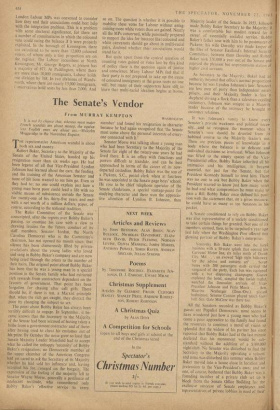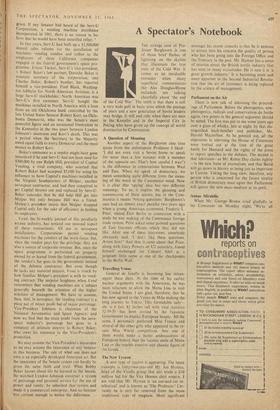The Senate's Vendor
From MURRAY KEMPTON
WASHINGTON
It is not by chance that, whereas most major French scandals are about money, the equiva- lent English . ones are about sex.—Malcolm Muggeridge in the November Esquire. THE representative American scandal is about both sex and money. Robert Baker, Secretary to the Majority of the Senate of the United States, handed up his resignation more than six weeks ago. He had
been legatee of all that Vice-President Lyndon Johnson had learned about the care, the feeding, and the training of the American Senator and none of his lions wanted to see him go. Even so they had to; no one could explain just how a young man born poor could lead a life with no visible means of subsistence outside the Senate for twenty-one of his thirty-five years and end
with a net worth of a million dollars, paper, of course, according to the national tradition. The Rules Committee of the Senate was conscripted, after the regrets over Bobby Baker's passing, to examine his case with a view to drawing lessons for the future conduct of its staff members. Senator Jordan, the North Carolina Democrat who is the Committee's chairman, has not opened his mouth since; that silence has been clamorouSly filled by private.
revelations about the young ladies who loved and sang in Bobby Baker's company and are now being cried 'through the prints to the number of their hairs. The original point about Bobby Baker has been that he was a young man in a special
position in the Senate family who had extracted rich rewards from contractors dependent on the favours of government. That point has been forgotten for chasing after call girls. There should be, if there is not, a Marxist principle that, when the rich get caught, they distract the poor by changing the subject.to sex.
The point about Bobby Baker has always been terribly difficult to engage. In September, it be- came known that the Secretary to the Majority of the Senate had been accused of having taken a bribe from a government contractor and of there-
after having tried to cheat his customer out of his prize. By October the noise grew so loud that Senate Majority Leader Mansfield had to accept what he called the unhappy 'necessity' of Bobby Baker's resignation; no Democratic member of the upper chamber of the American Congress had yet cared to ask the Secretary of its Majority whether he had sold his influence and, having accepted his fee, reneged on the bargain. The expression of the feeling of the majority fell to Senator Wayne Morse, generally a pestilence of intolerant rectitude, who remembered only Bobby Baker's 'effective service to every
member' and found his resignation in character because he had again recognised that 'the Senate must come above the personal interests of every- one connected with it.'
Senator Morse was talking about a young man who had been Secretary to the Majority of the Senate for eight of the twenty-one years he had lived there. It is an office with functions and powers difficult to translate, and can be best approached in terms of the career of its now- departed custodian. Bobby Baker was the son of a Pickens, S.C., postal clerk when at fourteen he was appointed to the Senate page boys' school. He rose to be chief telephone operator of the, Senate cloakroom, a special vantage-point for studying character and there won the apprecia- tive attention of Lyndon B. Johnson, then
Majority leader of the Senate. In 1955, Johnson- made Bobby Baker Secretary to the Majority; it was a comfortable but modest reward for a career of essentially socialist service. 'Bobby Baker's father rose with him to be postmaster of Pickens; his wife Dorothy was made keeper of the files of Senator Eastland's Internal Security Committee: between them Dorothy and Robert Baker took $:,0.000 a year out of the Senate and enjoyed the pleasant but unpretentious station sf higher civil servants.
As Secretary to the Majority, Baker had an authority beyond that office's normal proportions . because he was Lyndon Johnson's heir. Senators are less men of party than independent enter- prisers, and their Majority leader is less a shepherd driving a flock than a salesman cajoling customers. Johnson was uniqUe as a Majority leader because of, the intimacy he brought to customer relations.
It was lohnson's vanity to know every Senator's private weakness and political neces- sity,. and to recognise the moment when a Senator's vote should be diverted from its habitual course to the Majority leader's use. These are precious pieces of knowledge in a body where the balance is so delicate and individual decisions so irrational. When Johnson was lifted to the empty spaces of the Vice- Presidential office. Bobby Baker inherited all his intimacies and his intelligence; it became essential, not just for the Senate, but for President Kennedy himself to trust him. There was no one to ask but Bobby Baker when the President wanted to know just how many votes he had and what compromises he must make to pass a Bill. Bobby Baker once defined hi, Lion with the statement that, on a given measure, he could have as many as ten Senators in his pocket.
A Senate conditioned to rely on Bobby Baker was also representative of a society conditioned to take certain things for granted. Not one of its members seemed, then, to be surprised a year ago last July when the Washington Post offered this glowing portrait of Bobby Baker's enterprise
Yesterday Bob Baker went into the hotel business with a 50-state splash that opened his Carousel Motor Inn; six miles north of Ocean City. Md... an avowed 'high style hidcaw iv for the advise and consent set' . . . SeN,1) buses with 200 passengers each carried the vanguard of the party. Each bus was equipped with a bar dispensing champagne. Guests explored the hotel, sampled the lavish buffet, watched the limousine arrivals of Vice- President Johnson and Perk Mesta . . . Sen. Maurine Neuberger (Dem.-Ore.) played badminton. Senator Cannon played touch foot- ball. Sen. Gale McGree was there too.
All the Senators recorded as Bobby Baker's guests are Populist Democrats; none seems to have wondered just how a young man who had come a poor apprentice to the family had found the resources to construct a motel of vision so splendid that the widow of his partner has since reported that Bobby Baker had at the last minute declared that his monument would be sub- standard without the addition of a $100,000 night-club. No Senator was disturbed to find the Secretary to the Majority operating a saloon; and none was disturbed this summer when Bobby Baker moved into a house close in location and pretension to the Vice-President's own: and no one, of course, bothered that Bobby Baker was a founding member of a priVate club set up a • block from the Senate Office Building for the exclusive surcease of Senate employees and representatives of private lobbies in need of their
grace. If any Senator had heard of the Serv-U Corporation, a vending machine distributor incorporated in 1961, there is no reason to be- lieve that he would have been unsettled either.'
In two years, Serv-U had built up a $3,500,000 annual sales volume for the installation of machines vending candies and coffee to the employees of three California companies engaged in the federal government's space pro- gramme. Ernest Tucker, Serv-U's vice-president, is Robert Baker's law partner; Dorothy Baker is assistant secretary 'of the corporation; and Charles Baker, Robert's brother, has reported himself a vice-president. Fred Black, Washing- ton lobbyist for North American Aviation, is a large Serv-U stockholder; North American was Serv-U's first customer. Serv-U bought the machines installed in North America with a loan from an old Oklahoma bank controlled by the late United States Senator Robert Kerr, an Okla- homa Democrat, who was the Senate's most powerful figure and an occasional frustration to the Kennedys in the two years between Lyndon Johnson's ascension and Kerr's death. This was a period when the Secretary to the Majority owed equal faith to every, Democrat and the most money to Robert Kerr.
Baker's eminence as a vendor might have gone Unnoticed if he and Serv-U had not been sued for $300,000 by one Ralph Hill, president of Capital Vending, a rival company, who asserted that Robert Baker had accepted $5,600 for using his influence to have Capital's machines installed in the Virginia headquarters of Melpar, another aerospace contractor, and had then conspired to get Capital thrown out and replaced by Serv-U. Baker concedes that he did help Hill get into Melpar but only because Hill was a friend. Melpar's president insists that Melpar dropped Capital only for the sake of efficiency in feeding its employees.
Vend, the bi-weekly journal of this peculiarly arcane industry, has noticed one unusual aspect of these transactions. All are in aerospace installations. Corporations permit vending machines for the comfort of the work-force; but, since the vendor pays for the privilege, they are also a source of corporate revenue. But, since the space programme is performed on property owned by or leased from the federal government, the vendor's fee goes to the government instead of the defence contractor. But even though he lacks any material interest, Vend is struck by how familiar Melpar's president is with its vend- ing contract. The surprise heightens when Vend remembers that vending machines are a subject generally beneath the attention of the higher echelons of management. We have to assume, then, thaLin aerospace, the vending contract is a piece not of minor profit but of major patronage. Vice-President Johnson is chairman of the National Aeronautics and Space Agency; and now we find that the main profit from the aero- space industry's patronage has gone to a company of intimate interest to Robert Baker, who owes his existence to the Vice-President's protection.
We may assume the Vice-President's innocence as we may assume the innocence of any Senator in this business. The sale of what one does not own is an especially developed American art. But the innocence of the Senate system can hardly be given the same faith and trust. What Bobby Baker knows about life he learned in the Senate. He watched Lyndon Johnson construct a system of patronage and personal service for the use of power and vanity: he inherited that system and made it a commercial enterprise. And no Senator was curious enough to notice the difference.



































 Previous page
Previous page